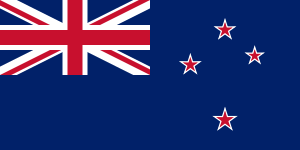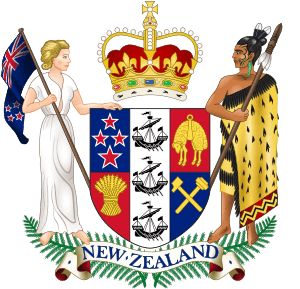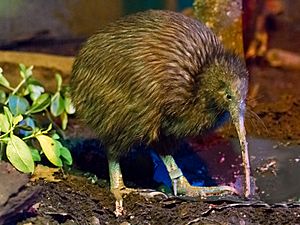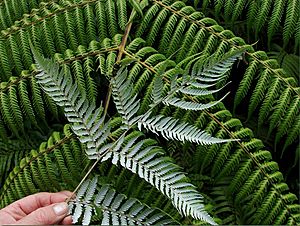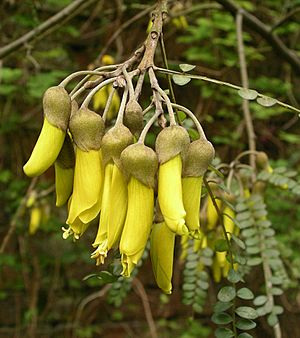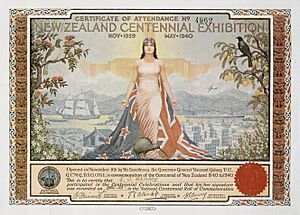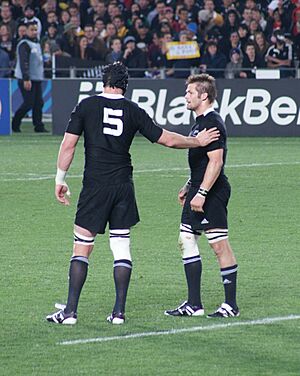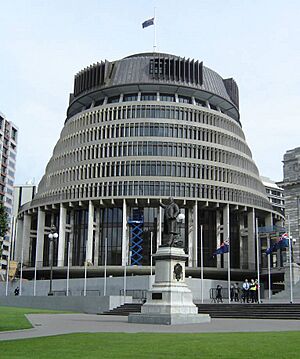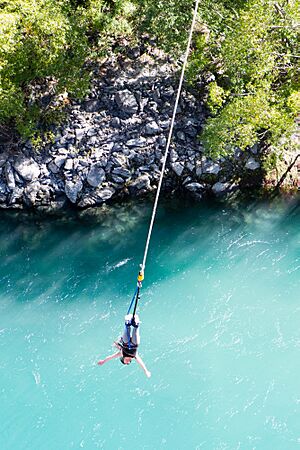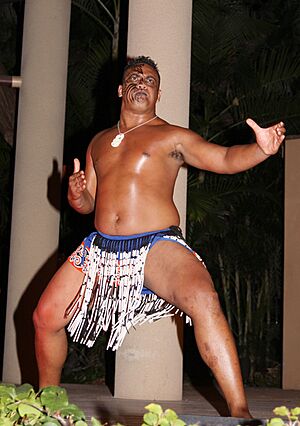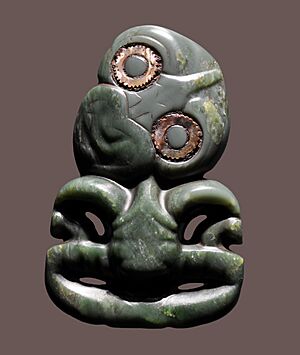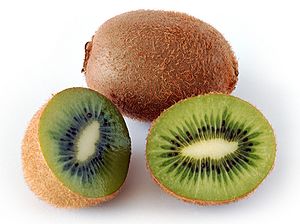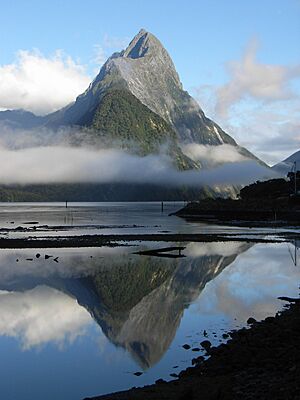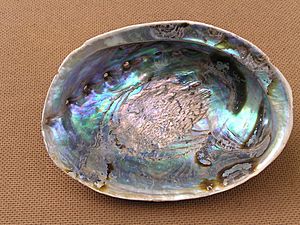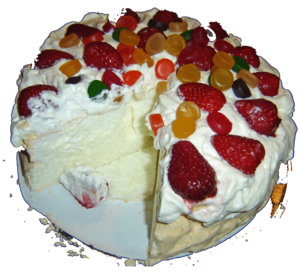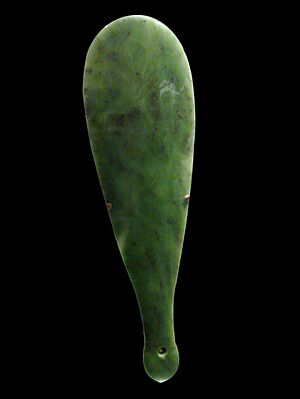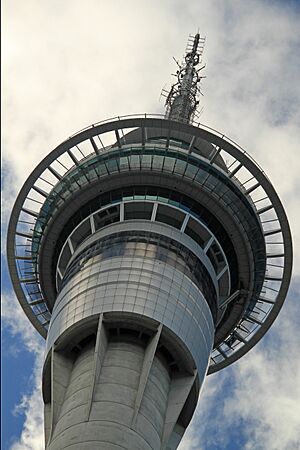National symbols of New Zealand facts for kids
New Zealand is a country in the Pacific Ocean, famous for its beautiful landscapes and unique culture. Like many nations, it has special symbols that help people understand its history and what makes it unique. These symbols can be official, like the flag, or unofficial, like certain animals or plants. They all help tell the story of New Zealand and its people.
Contents
Official Symbols of New Zealand
New Zealand has several official symbols that are recognized by the government. These symbols are important because they represent the country on the world stage and are used for official events.
The New Zealand Flag
The flag of New Zealand was officially adopted on 24 March 1902. It is a dark blue flag with a small Union Jack (the flag of the United Kingdom) in the top left corner. On the right side, it features four red stars with white outlines. These stars form the Southern Cross, a famous group of stars seen in the night sky of the Southern Hemisphere. The flag shows New Zealand's history and its connection to the British Commonwealth.
The Coat of Arms
The Coat of arms of New Zealand is the country's official emblem. It was updated in 1956 by Queen Elizabeth II. The coat of arms includes a shield with different symbols representing New Zealand's agriculture, trade, and Māori heritage. On one side of the shield is a European woman holding the New Zealand flag, and on the other side is a Māori warrior holding a traditional weapon. Below them are silver fern leaves, a very important plant in New Zealand.
National Anthems
New Zealand has two official national anthems: "God Defend New Zealand" and "God Save the Queen". "God Defend New Zealand" became an official anthem in 1977. It is usually the one played at most events, like sports games or national celebrations. "God Save the Queen" (or "God Save the King" when a king is on the throne) is mostly used as the royal anthem, played when members of the royal family are present.
National Colours
The national colours of New Zealand are black, red ochre, and white (or silver). These colours have been used in New Zealand's national honours system since 1975. They are also the colours of the national Māori flag, which became official in 1990. Red ochre, known as kokowai in Māori, is especially important in Māori culture. It has a spiritual meaning, representing life and energy.
Unofficial Emblems of New Zealand
Besides the official symbols, New Zealand also has several unofficial emblems. These are things that people commonly associate with the country, even if they aren't officially recognized by the government.
The Kiwi Bird
The Kiwi is a unique bird that cannot fly and is found only in New Zealand. It is often called the national bird. The term "Kiwis" has been used as a friendly nickname for New Zealanders since World War I. The bird itself has been a symbol for the country for a long time, showing its unique wildlife.
The Silver Fern
The Silver fern is a type of tree fern that grows only in New Zealand. It is often called ponga in Māori. The underside of its leaves is a shiny silver colour. The silver fern has been used to represent New Zealand since the 1880s and is a very popular symbol, especially in sports.
The Kōwhai Flower
The Kōwhai is an evergreen tree that produces bright yellow flowers in spring. These flowers are found all over New Zealand. The Department of Conservation says that the kōwhai is widely considered to be the national flower of New Zealand.
Zealandia
Zealandia is a female figure who used to be a popular way to represent New Zealand, especially in the late 1800s and early 1900s. She is rarely used today, except as a supporter on the country's coat of arms.
Cultural Icons of New Zealand
Beyond official and unofficial symbols, New Zealand has many cultural icons. These are popular items, places, or traditions that are well-known and often thought of as unique to the country. Some of these are even called "Kiwiana".
The All Blacks
The All Blacks are New Zealand's national rugby union team. They are famous worldwide and have won the Rugby World Cup multiple times. They are one of the country's most recognized sports teams.
The Beehive
The Beehive is the unique, round-shaped executive wing of the New Zealand Parliament Buildings in Wellington. Built in the 1970s, its distinctive shape makes it a well-known landmark.
Bungy Jumping
Bungy jumping was made popular by A.J. Hackett in the South Island of New Zealand. It has since become a popular extreme sport around the world, and New Zealand is often seen as its home.
Haka
The Haka is a traditional Māori war dance. Today, it is widely performed by New Zealand sports teams, like the All Blacks, as a challenge before games. Schools also use it as a way to show respect or honour.
Hei-tiki
Hei-tiki are traditional Māori ornamental pendants. They are often carved from pounamu (greenstone) and are highly valued in Māori culture.
Kiwifruit
The Kiwifruit is a popular fruit that was branded with this name by growers in New Zealand. It became a major export for the country and is now known globally.
Koru
The Koru is a spiral shape often seen in traditional Māori art. It represents the unfurling frond of a silver fern. The koru symbolizes new life, growth, strength, and peace.
The Lord of the Rings Films
The film trilogies of The Lord of the Rings and The Hobbit were filmed in New Zealand. These movies showed off New Zealand's stunning natural scenery to the world and are now strongly linked with the country.
Mitre Peak
Mitre Peak is a very distinctive mountain that stands tall over Milford Sound. Milford Sound is one of New Zealand's most popular tourist destinations, known for its incredible natural beauty.
Pāua
Pāua is a type of abalone, a sea snail. Its meat is considered a tasty food, and its beautiful, iridescent shell is often used to make jewellery and other decorations.
Pavlova
Pavlova is a light and airy meringue cake, topped with whipped cream and fresh fruit. It has a crispy outside and a soft, marshmallow-like centre. Both New Zealand and Australia claim to be its origin.
Pounamu (Greenstone)
Pounamu is a type of Nephrite jade, also known as "Greenstone." It is highly valued by Māori people for both its physical beauty and its spiritual importance. It is often carved into tools, weapons, and ornaments.
Sky Tower
The Sky Tower in Auckland opened in 1997. It is the tallest freestanding structure in the Southern Hemisphere. It offers amazing views of Auckland city and is a popular tourist attraction.
 | Janet Taylor Pickett |
 | Synthia Saint James |
 | Howardena Pindell |
 | Faith Ringgold |


